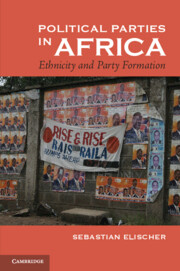Book contents
- Frontmatter
- Dedication
- Contents
- Tables
- Abstract
- Acknowledgments
- 1 Comparative Politics and Political Parties in Africa
- 2 A New Framework of Comparison for Political Parties
- 3 Kenya: The Ubiquity of Ethnic Parties
- 4 Namibia: The Dominance of Nonethnic Parties
- 5 Ghana: The Ubiquity of Nonethnic Parties
- 6 The Diversity of African Party Politics
- 7 Explaining the Formation of Nonethnic Parties
- Conclusion
- Annex A Operationalization of Secondary Party Types
- Annex B The Standard MRG Coding Frame
- Annex C Number of Effective Programmatic Categories
- Annex D Summary of Party Nationalization Scores (PNS) and Party Divergence Scores (PDS)
- Annex E Result for MRG Coding Scheme
- Annex F PNS Calculated on the Basis of Afrobarometer Data
- Annex G Scope of Party Systems Covered
- Annex H Party Nationalization Scores (PNS) of the Preliminary Cases
- Bibliography
- Index
2 - A New Framework of Comparison for Political Parties
Published online by Cambridge University Press: 05 June 2014
- Frontmatter
- Dedication
- Contents
- Tables
- Abstract
- Acknowledgments
- 1 Comparative Politics and Political Parties in Africa
- 2 A New Framework of Comparison for Political Parties
- 3 Kenya: The Ubiquity of Ethnic Parties
- 4 Namibia: The Dominance of Nonethnic Parties
- 5 Ghana: The Ubiquity of Nonethnic Parties
- 6 The Diversity of African Party Politics
- 7 Explaining the Formation of Nonethnic Parties
- Conclusion
- Annex A Operationalization of Secondary Party Types
- Annex B The Standard MRG Coding Frame
- Annex C Number of Effective Programmatic Categories
- Annex D Summary of Party Nationalization Scores (PNS) and Party Divergence Scores (PDS)
- Annex E Result for MRG Coding Scheme
- Annex F PNS Calculated on the Basis of Afrobarometer Data
- Annex G Scope of Party Systems Covered
- Annex H Party Nationalization Scores (PNS) of the Preliminary Cases
- Bibliography
- Index
Summary
Political parties are indispensable for democratic rule. Parties bridge the gap between the state and civil society; they aggregate the interest of their respective populations and, in doing so, structure the popular vote; they integrate and mobilize the citizenry; and they are in charge of recruiting the national political leadership. In short, parties are the primary vehicle for political participation. The nature of parties determines the nature of political competition. In societies in which particularistic parties prevail, participation is likely to be characterized by exclusion, which holds potentially detrimental consequences for state stability and peace. For a long time, scholars saw political participation in Africa structured around ethnic loyalties. In the last decade or so, a number of studies have challenged that view. Yet despite this growing interest in African politics following the introduction of multiparty competition in the early 1990s, no party typology for African parties has emerged from the scholarship. As a result of the absence of a suitable party typology, scholars know very little about the nature of African parties and thus little about the nature of political competition. This chapter creates a new framework of analysis of parties and thus provides the conceptual basis for empirically grounded research on parties in nonindustrialized societies. Twenty years after the third wave of democratization, such an endeavor is long overdue.
This chapter begins with a succinct overview of the dominant party models in the Western world and beyond. The purpose of this section is twofold. First, it confirms the rising perception among scholars that the conventional party models are unsuited to the analysis of contemporary African parties – more specifically, that the prevailing models do not fit contemporary parties anywhere in post–third–wave democracies. Second, it introduces the indicators that comparative scholars and area experts have applied to operationalize existing party models.
- Type
- Chapter
- Information
- Political Parties in AfricaEthnicity and Party Formation, pp. 11 - 42Publisher: Cambridge University PressPrint publication year: 2013



